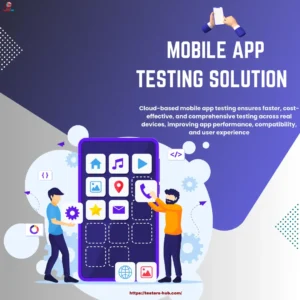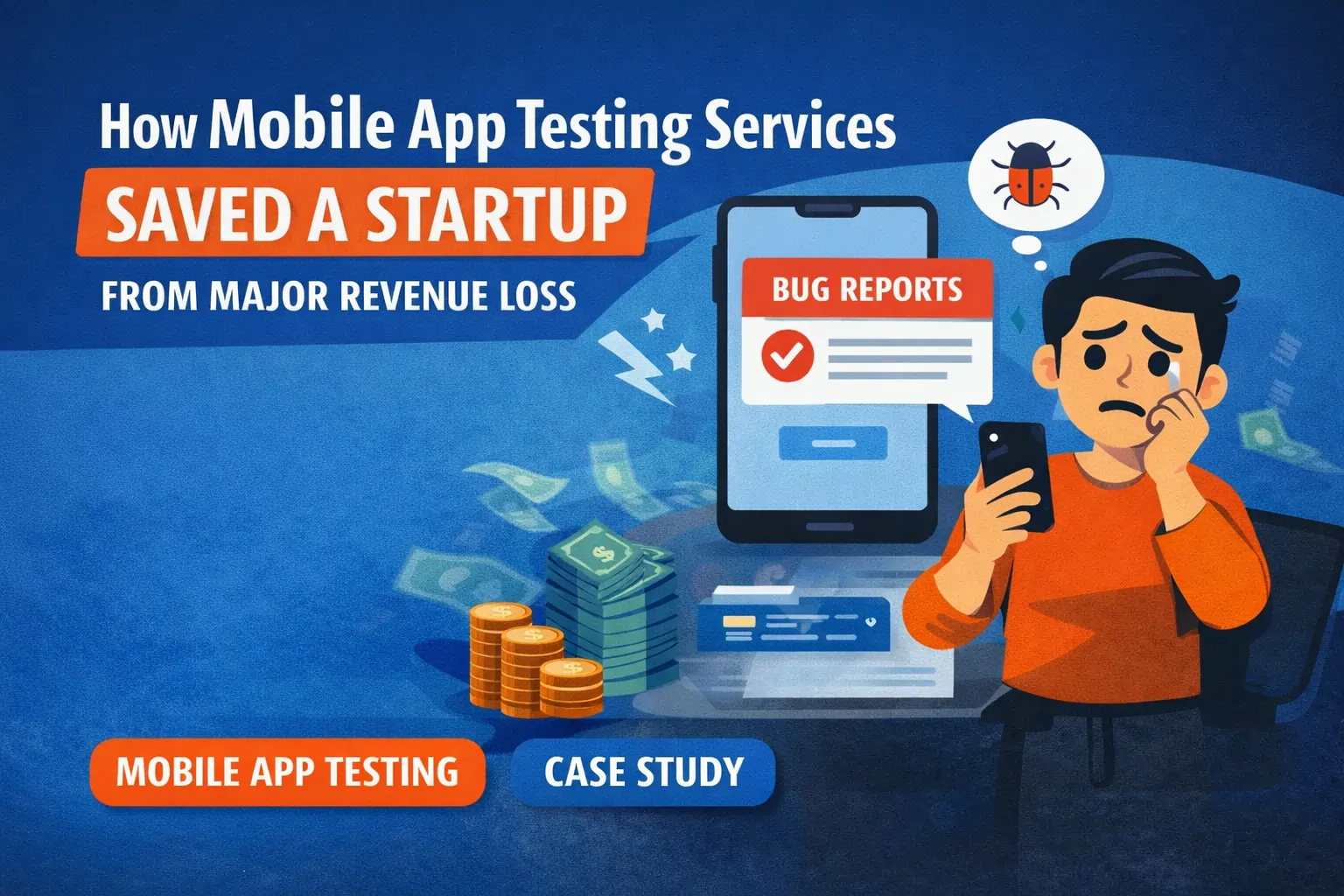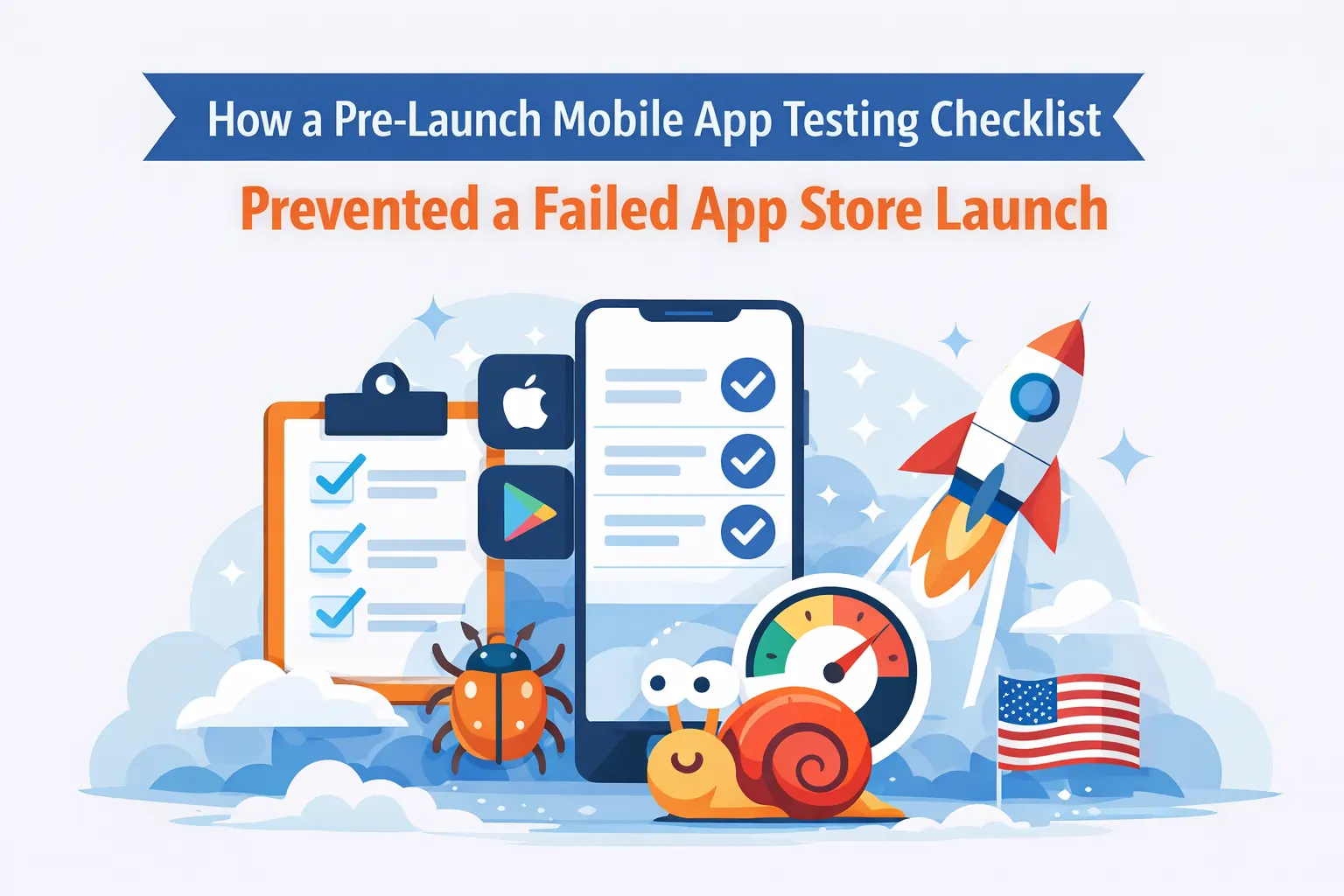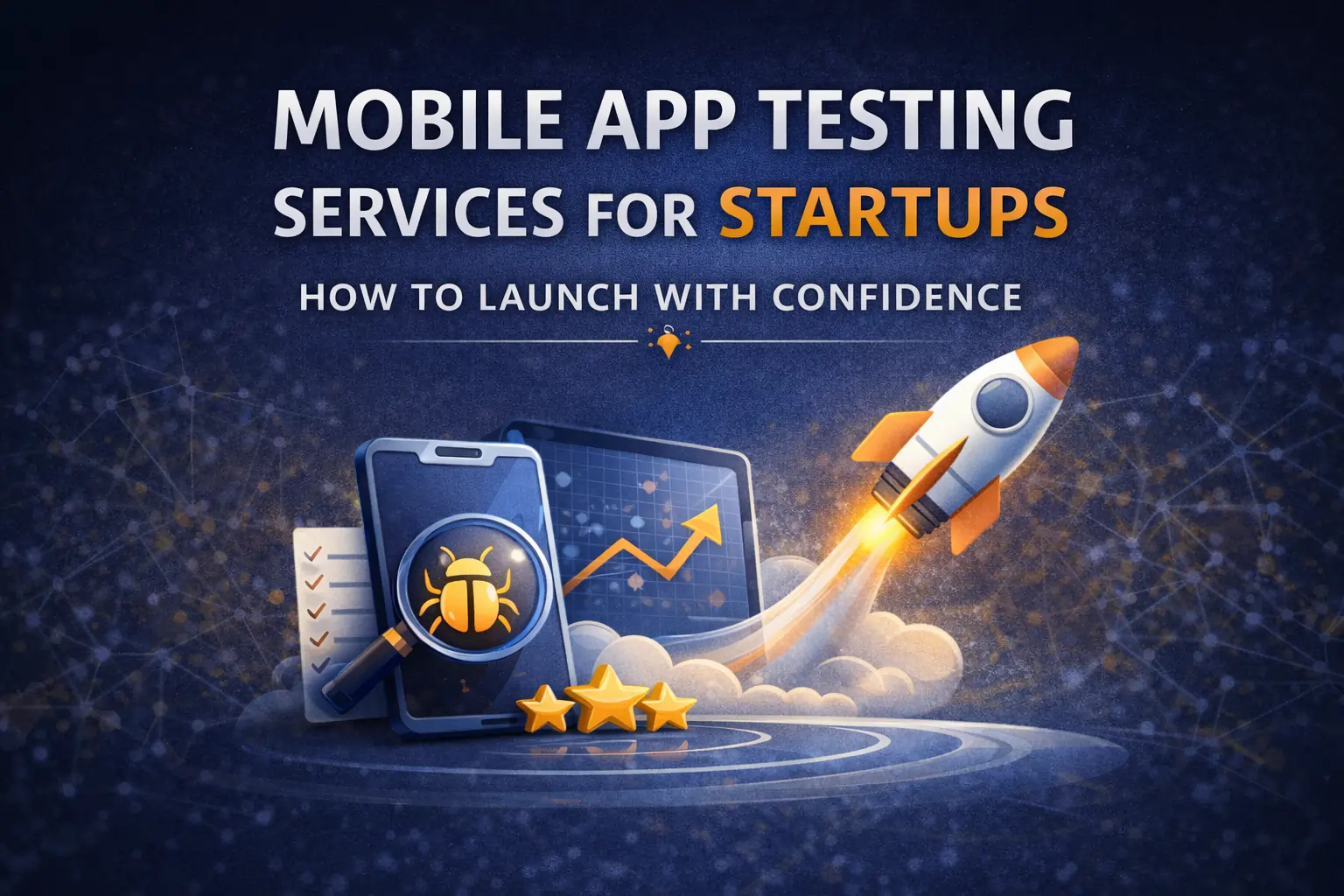Cloud-Based Mobile App Testing Solutions: A Tester’s Guide to Ensuring Superior Quality
Mobile applications dominate the digital world, providing essential services, entertainment, and connectivity. As the demand for seamless, high-performing apps grows, so does the need for comprehensive testing. The complexity of mobile environments—with fragmented devices, operating systems, and user expectations—requires advanced solutions to ensure apps function flawlessly.
For software testers, mobile app testing services have become an indispensable component of the development lifecycle. With the advent of cloud-based mobile testing solutions, testers can efficiently tackle challenges like device fragmentation, usability issues, and performance bottlenecks while meeting deadlines and reducing costs.
This blog explores the in-depth advantages of cloud-based testing platforms, offering insights into their benefits, features, use cases, and future trends from a software tester’s perspective.

Why Mobile App Testing is Crucial
Providing Smooth User Experiences
In a time when consumers demand faultless designs and quick replies, a subpar app might result in bad reviews and a high uninstall rate. Testing mobile apps guarantees that they have reliable performance, user-friendly interfaces, and flawless operation.
Taking Care of Device Fragmentation
With hundreds of models, operating systems, and screen resolutions available, the mobile device market is extremely fragmented. Regardless of the user’s hardware or software environment, mobile application testing guarantees compatibility across this wide range of devices, allowing apps to function as intended.
Meeting Market and Regulatory Demands
With rising competition, businesses need to release apps quickly without compromising quality. Additionally, apps in regulated industries (e.g., healthcare and finance) must meet strict security and compliance standards. Mobile testing services help QA teams balance speed, quality, and compliance.
The Benefits of Cloud-Based Mobile Testing
What Are Mobile Testing Solutions Based in the Cloud?
App tests are conducted on actual or virtual devices that are hosted on distant servers as part of cloud-based mobile testing. Without requiring real hardware, these platforms enable testers to verify apps across a variety of devices and situations.
The main advantages of cloud-based mobile testing solutions will be thoroughly examined here.
1. Access to Real Devices for Accurate Testing
Why Real Devices Matter
Testing on real devices offers accuracy and reliability unmatched by emulators or simulators. Real devices replicate actual user environments, revealing issues that might otherwise go unnoticed.
Key Advantages of Real Devices in Cloud Testing
- Comprehensive Compatibility Testing: Test apps on a variety of hardware configurations, screen sizes, and resolutions.
- Real-World Scenarios: Evaluate performance under conditions like low network speed, limited battery, or high CPU usage.
- User Interaction Validation: Ensure touch gestures, animations, and transitions work flawlessly.
For example, mobile device testing platforms in the cloud allow testers to assess hardware-specific bugs, such as performance differences between flagship and budget devices.
2. Scalability to Meet Project Demands
The Need for Scalable Testing
Projects often require testing on dozens or even hundreds of device and OS combinations, especially for global releases. Setting up a physical lab with such capacity is both expensive and time-consuming.
How Cloud Platforms Enable Scalability
- Parallel Testing: Run multiple tests simultaneously across devices.
- On-Demand Resources: Scale testing efforts up or down based on project needs.
- Global Access: Test on devices located worldwide to ensure compatibility in various regions.
For example, a mobile app testing company launching a social media app can use cloud scalability to test it on thousands of devices simultaneously, significantly reducing time-to-market.
3. Cost-Effectiveness for QA Teams
The Financial Burden of Physical Labs
Hardware purchases, device updates, and infrastructure maintenance are expensive aspects of running a physical device lab. These costs may be unaffordable for new and small enterprises.
How Costs Are Decreased by Cloud Testing
- No Hardware Expenses: Get access to a variety of gadgets without really owning them.
- Pay only for the time and resources utilized with pay-as-you-go pricing.
- Decreased Maintenance Work: Cloud providers take care of device replacements, maintenance, and software upgrades.
Instead of managing actual devices, testers may concentrate their budgets on enhancing test quality and coverage by implementing mobile app testing platforms.
4. Faster Time-to-Market
The Importance of Speed
In a competitive market, releasing an app quickly can be the difference between success and failure. Slow testing cycles can delay deployment and give competitors an edge.
How Cloud Testing Accelerates Releases
- Automated Testing: Automate repetitive tasks like regression and functional testing using frameworks like Appium, Espresso, and XCUITest.
- Parallel Execution: Simultaneously test on multiple devices and configurations.
- Early Bug Detection: Identify issues earlier in the development cycle, reducing the time spent on rework.
A mobile app automation testing platform can help teams shorten release cycles while maintaining high quality.
5. Comprehensive Test Coverage
Ensuring End-to-End Validation
Mobile apps must excel in multiple areas to succeed, including functionality, performance, usability, and security. Cloud platforms offer tools to ensure comprehensive mobile app testing, including:
- Functional Testing: Validating workflows and features.
- Usability Testing: Ensuring intuitive design and navigation.
- Performance Testing: Evaluating speed and stability under various conditions.
- Security Testing: Identifying vulnerabilities to protect user data.
With mobile device testing services, testers can cover all these aspects efficiently, reducing the risk of post-release issues.
6. Cross-Device Compatibility Testing
The Challenge of Device Fragmentation
Different devices and OS versions introduce unique behaviors, making cross-device compatibility testing essential.
How Cloud Platforms Simplify Compatibility Testing
- Access to Legacy and New Devices: Test apps on older models and the latest releases.
- Diverse Configurations: Validate apps against various screen sizes, aspect ratios, and hardware capabilities.
For example, an android app testing service might use a cloud platform to test compatibility on both high-end and entry-level Android devices.
7. Seamless Collaboration for Distributed Teams
Remote Work Challenges
Modern QA teams often work across geographies, making collaboration and data sharing crucial.
Features of Cloud Platforms That Enhance Collaboration
- Real-Time Test Reports: Share test results instantly with stakeholders.
- Centralized Test Data: Store logs, screenshots, and performance metrics in a shared repository.
- Integrated Communication Tools: Use built-in messaging and reporting features to streamline feedback.
For example, a mobile app QA testing team distributed across multiple countries can use cloud tools to collaborate efficiently and resolve issues faster.
8. Simplified Maintenance
Challenges of Physical Testing Labs
Setting up and maintaining a physical testing lab involves installing software, updating devices, and troubleshooting hardware failures.
How Cloud Platforms Reduce Maintenance
- Preconfigured Environments: Platforms come ready with preinstalled tools and software.
- Automatic Updates: Providers handle OS and app updates for test devices.
- 24/7 Uptime: Access devices anytime without worrying about maintenance.
This allows QA teams to focus on testing rather than managing infrastructure.
9. Automated Testing for Increased Efficiency
Benefits of Automation
Automation is a key feature of cloud platforms, enabling testers to:
- Save time by automating repetitive tasks.
- Reduce human error during test execution.
- Increase test coverage by running scripts across multiple devices.
Popular Automation Tools for Mobile Testing
- Appium: A versatile tool for cross-platform testing.
- Espresso: Ideal for Android-specific automation.
- XCUITest: Designed for iOS automation testing.
For example, a mobile app test automation service provider can use Appium to automate UI tests for both Android and iOS apps simultaneously.
10. Global Testing for Diverse User Bases
Why Test Apps Globally?
Apps that target international audiences need to function well across various network conditions, languages, and cultural preferences.
How Cloud Platforms Enable Global Testing
- Network Simulation: Test under different conditions, from fast 5G to slow 2G connections.
- Localization Testing: Ensure text, currency, and formatting match regional norms.
- Geolocation Testing: Validate features like location-based services.
Using cloud mobile device testing, teams can ensure their apps perform well worldwide.
11. Testing for Security and Compliance
The Value of Safety
Strict restrictions must be followed by mobile apps that handle sensitive data, such as those in the healthcare and financial industries.
Cloud Platform Security Features
- During testing, user data is protected by data encryption.
- Access controls restrict who has the ability to see or alter test environments.
- Compliance Standards: Complies with PCI DSS, GDPR, HIPAA, and more.
QA teams may guarantee security and compliance by utilizing mobile application testing services.
12. Integration with CI/CD Pipelines
Modern Development Practices
New code changes are tested and released quickly thanks to continuous integration (CI) and continuous delivery (CD).
The Function of Cloud Testing in CI/CD
- Automated Triggering: When code is committed, tests are run automatically.
- Smooth Integration: Works with CircleCI, Jenkins, and GitLab, among other tools.
- Quicker Feedback Cycles: Reduce the amount of effort spent debugging by identifying problems early.
Workflows are streamlined and app quality is enhanced with the use of a mobile app testing platform that interfaces with CI/CD pipelines.
13. Continuous Improvement with Real-Time Insights
The Value of Feedback
Real-time analytics and detailed reports from cloud platforms enable teams to improve continuously.
Key Features of Cloud Analytics
- Performance Metrics: Monitor CPU, memory, and battery usage during tests.
- Error Logs: Pinpoint the cause of failures.
- User Insights: Gather data on how users interact with apps.
By analyzing these insights, QA teams can refine their strategies and deliver better apps.
Conclusion
The rise of cloud-based mobile app testing solutions has revolutionized how QA teams approach mobile testing. With access to real devices, automated tools, and scalable resources, cloud platforms empower testers to deliver high-quality apps efficiently and cost-effectively. Whether you’re developing an Android app, an iOS app, or a cross-platform solution, adopting cloud testing ensures seamless functionality, compatibility, and user satisfaction. Partnering with a leading mobile app testing company can help you leverage these technologies and achieve success in a competitive market. Choose cloud-based mobile testing today to future-proof your app development process and deliver apps that delight users worldwide!










